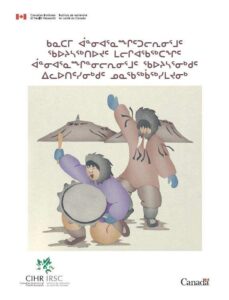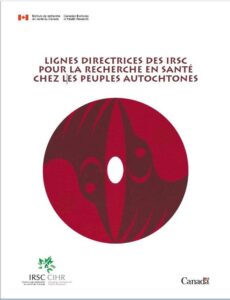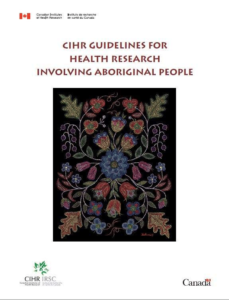About ICRP
Purpose
There is a need for practical guidance in research conducted with Indigenous people, in ways that promote equitable partnerships [1].
The training resource is in the form of four modules, developed to provide guidance on how to conduct research that reflects, advances, and meets expectations for ethical, collaborative, and culturally supportive engagement with Inuit, Métis and First Nations individuals and communities.
The training resource is designed to be strengths-based, meaning that it is meant to promote “important strengths or protective factors, such as social cohesion, a sense of positive well being and resilience and connection to the land, spirituality and ancestry” [2](p.3).
Vision
The vision for this training resource is found in a document called Canadian Institutes for Health Research Guidelines for Health Research Involving Aboriginal People (2007-2010) (“CIHR Guidelines”) [3]. It is the CIHR Guidelines that have provided the source of inspiration for the training resource.
The intent of this training resource is for it to be shared, to build a network to train the trainers, and in ways that trainee resource users themselves envision, and in ways that effect change. Ideally, the site of the training resource will become a place where resources are shared with a network of researchers who complete this training, and as something that is ever-expanding and growing with contributions from communities as well as researcher- and trainee-users of the training resource.
The training resource is designed to inform and inspire a collaborative approach to research, and to build a community of practice that extends beyond the parameters of the training resource.

CIHR Guidelines: Download the PDFs
Aim
The aim of the training resource is to encourage all those in research environments to engage with principled approaches to research, and is based on a publication by the developers of this training resource [1]. The intent is that this training resource will be updated as new understandings are developed.
The training resource is designed to assist researchers who are new to research in partnerships with Indigenous communities, or who are researchers-in-training, to:
Relevance
Although the training resource has been developed in the context of the health research sector, the training is relevant and applicable to any and all who wish to or currently do conduct research with Indigenous individuals and communities. You will find references to health throughout these modules, however, the principles of the training resource can and should be applied to any and all other disciplines of research with Indigenous partnerships.
A principle-based approach to research conduct holds potential to guide research that reflects, advances, and meets expectations for ethical, collaborative, and culturally supportive engagement with Inuit, Métis and First Nations individuals and communities.
References
- Jull, J, King A, King M, Graham ID, Morton Ninomiya M, Jacklin K, Moody-Corbett P, Moore J. A Principled Approach to Research Conducted with Inuit, Métis and First Nations People: promoting engagement inspired by the CIHR Guidelines for Health Research Involving Aboriginal People (2007-2010). The International Indigenous Policy Journal (2020). The International Indigenous Policy Journal, 11(2). https://ojs.lib.uwo.ca/index.php/iipj/article/view/10635
- Kelly, K., Dudgeon, P., Gee, G., & Glaskin, B. (2009). Living on the edge: Social and emotional wellbeing and risk and protective factors for serious psychological distress among Aboriginal and Torres Strait Islander people. Discussion Paper No. 10. Retrieved from http://www.indigenouspsychology.com.au/Assets/Files/AIPA-Living-on-the-Edge-web.pdfLet
- Canadian Institutes of Health Research (2013). CIHR Guidelines for health research involving Aboriginal people (2007-2010). Ottawa, Ontario. Retrieved from http://www.cihr-irsc.gc.ca/e/29134.html
- Ball J & Janyst P. (2008). Enacting research ethics in partnerships with indigenous communities in Canada: “Do it in a good way”. Journal of Empirical Research on Human Research Ethics, 3(2), 33-51.
- Estey EM, Smylie J, Macaulay A, for the CIHR – Institute of Aboriginal Peoples’ Health. (2009). Aboriginal Knowledge Translation. Understanding and Respecting the Distinct Needs of Aboriginal Communities in Research. Retrieved from https://cihr-irsc.gc.ca/e/41392.html
- Kirkness VJ & Barnhardt R. (1991). First Nations and Higher Education: The Four R’s–Respect, Relevance, Reciprocity, Responsibility. Journal of American Indian Education, 30(3): 1-15.
- Harris LD, & Wasilewski J. (2004). Indigeneity, an alternative worldview: Four R’s (relationship, responsibility, reciprocity, redistribution) vs. two P’s (power and profit): Sharing the journey towards conscious evolution. Systems Research and Behavioral Science, 21(5), 489-503.
- Restoule JP. (2008, November 26). The five R’s of Indigenous research: Relationship, respect, relevance, responsibility, and reciprocity. Workshop presented at the Wise Practices II: Canadian Aboriginal AIDS Network Research and Capacity Building Conference, Toronto, Ontario, Canada.
- Styres S & Zinga D. (2013). The community-first land-centred theoretical framework: Bringing a ‘good mind’ to Indigenous education research? Canadian Journal of Education, 36(2), 284-313.



